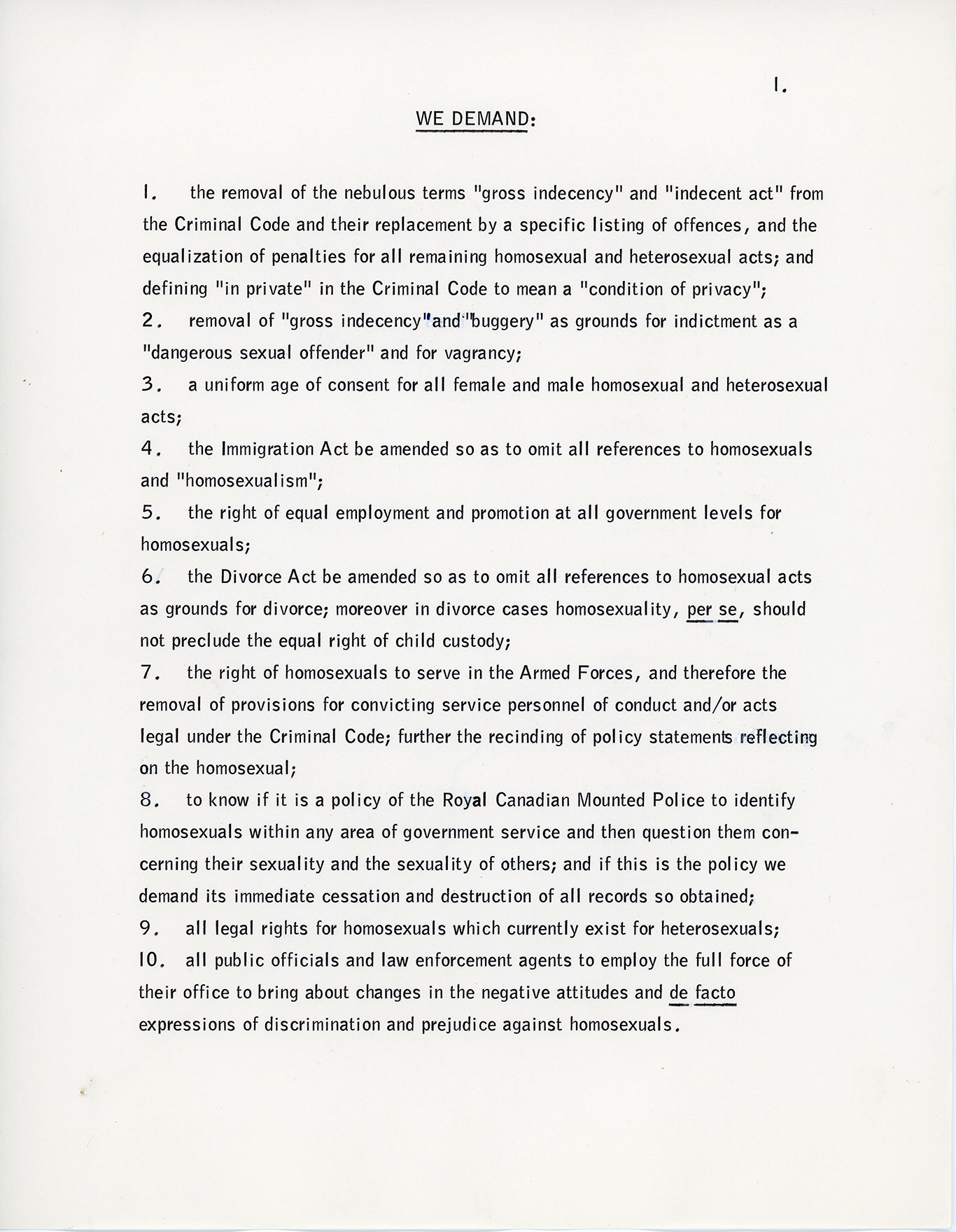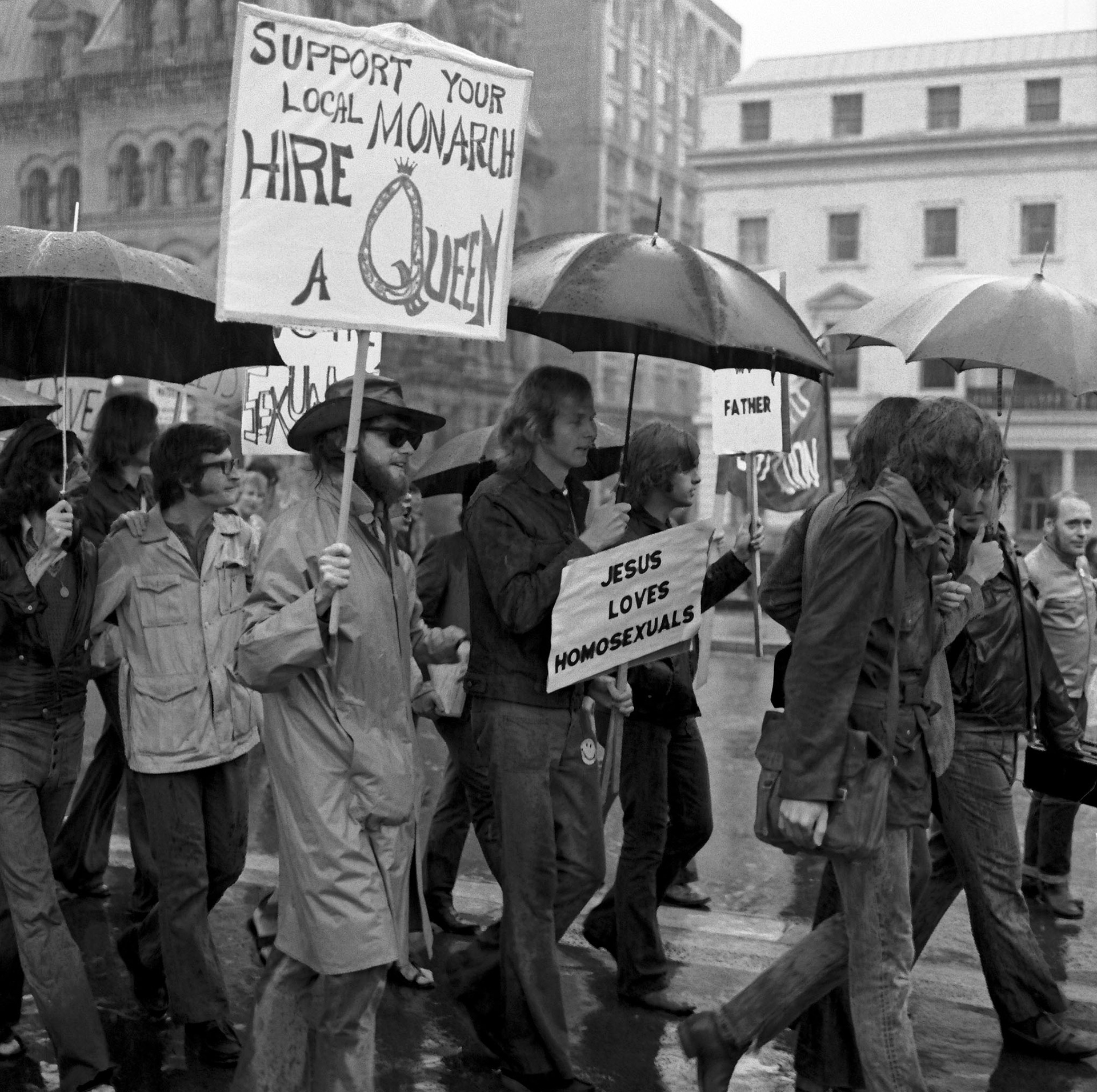Demands Presented to the Federal Government from the Gay Action Committee
Document
Image
Video
Audio
 Activities
Activities
Think
How does the list of 10 demands reflect the limitations of equality, as outlined in the Omnibus Bill?
Do
Re-read the list of 10 demands and rewrite them in your own words.
Details
 Materials
Materials - Ink
- Paper
Historical Context
Choose one of the three levels below to match your needs.
- The “We Demand” protest in 1971 presented 10 demands to the federal government.
- Many of the demands were related to provisions in the Criminal Code and other legislation that continued to discriminate against 2SLGBTQIA+ people, despite partial decriminalization of homosexuality in the 1969 Omnibus Bill.
- Today, most of the 10 demands have been met, although barriers to equality for 2SLGBTQIA+ people in Canada remain.
The Omnibus Bill of 1969 made limited reforms to elements of the Canadian legal system that had stigmatized and criminalized 2SLGBTQIA+ sexuality. However, many discriminatory provisions and government policies remained in place.
In 1971, a coalition of 2SLGBTQIA+ groups in Canada came together to draft a manifesto — known as “We Demand” — calling for 10 specific legislative and policy changes.
Organizers staged a protest on Parliament Hill in Ottawa on August 28, 1971 — the anniversary of the Omnibus Bill. A separate protest supporting the Ottawa action was held in Vancouver the same day.
Today, most of the 10 calls for action in “We Demand” have been met, although structural and social barriers to full equality remain.
The 1969 Omnibus Bill made limited reforms to elements of the Canadian legal system that had stigmatized and criminalized 2SLGBTQIA+ sexuality. However, many discriminatory provisions and government policies remained in place.
In 1971, a coalition of 2SLGBTQIA+ groups in Canada came together to draft a manifesto — known as “We Demand” — calling for specific legislative and policy changes.
Organizers staged a protest on Parliament Hill in Ottawa on August 28, 1971 — the anniversary of the Omnibus Bill. Their goal was to bring their demands for reform straight to the seat of government. A separate protest supporting the Ottawa action was held in Vancouver the same day.
Speaking at the Ottawa protest, young activist Charles (Charlie) Hill noted that, “We’re no longer willing to quietly give thanks for a few crumbs begrudgingly given us by our own government. We’re here to demand full equality. […] We’ve come here today to asset our pride in ourselves. To say we’re homosexual and proud of it. We’re coming together and uniting to manifest our own power as Gays.”
Today, the substance of most of the 10 calls for action in “We Demand” have been met, although structural and social barriers to full equality remain.
- The “We Demand” protest in 1971 presented 10 demands to the federal government.
- Many of the demands were related to provisions in the Criminal Code and other legislation that continued to discriminate against 2SLGBTQIA+ people, despite partial decriminalization of homosexuality in the 1969 Omnibus Bill.
- Today, most of the 10 demands have been met, although barriers to equality for 2SLGBTQIA+ people in Canada remain.
The Omnibus Bill of 1969 made limited reforms to elements of the Canadian legal system that had stigmatized and criminalized 2SLGBTQIA+ sexuality. However, many discriminatory provisions and government policies remained in place.
In 1971, a coalition of 2SLGBTQIA+ groups in Canada came together to draft a manifesto — known as “We Demand” — calling for 10 specific legislative and policy changes.
Organizers staged a protest on Parliament Hill in Ottawa on August 28, 1971 — the anniversary of the Omnibus Bill. A separate protest supporting the Ottawa action was held in Vancouver the same day.
Today, most of the 10 calls for action in “We Demand” have been met, although structural and social barriers to full equality remain.
The 1969 Omnibus Bill made limited reforms to elements of the Canadian legal system that had stigmatized and criminalized 2SLGBTQIA+ sexuality. However, many discriminatory provisions and government policies remained in place.
In 1971, a coalition of 2SLGBTQIA+ groups in Canada came together to draft a manifesto — known as “We Demand” — calling for specific legislative and policy changes.
Organizers staged a protest on Parliament Hill in Ottawa on August 28, 1971 — the anniversary of the Omnibus Bill. Their goal was to bring their demands for reform straight to the seat of government. A separate protest supporting the Ottawa action was held in Vancouver the same day.
Speaking at the Ottawa protest, young activist Charles (Charlie) Hill noted that, “We’re no longer willing to quietly give thanks for a few crumbs begrudgingly given us by our own government. We’re here to demand full equality. […] We’ve come here today to asset our pride in ourselves. To say we’re homosexual and proud of it. We’re coming together and uniting to manifest our own power as Gays.”
Today, the substance of most of the 10 calls for action in “We Demand” have been met, although structural and social barriers to full equality remain.
Summary
- The “We Demand” protest in 1971 presented 10 demands to the federal government.
- Many of the demands were related to provisions in the Criminal Code and other legislation that continued to discriminate against 2SLGBTQIA+ people, despite partial decriminalization of homosexuality in the 1969 Omnibus Bill.
- Today, most of the 10 demands have been met, although barriers to equality for 2SLGBTQIA+ people in Canada remain.
Essential
The Omnibus Bill of 1969 made limited reforms to elements of the Canadian legal system that had stigmatized and criminalized 2SLGBTQIA+ sexuality. However, many discriminatory provisions and government policies remained in place.
In 1971, a coalition of 2SLGBTQIA+ groups in Canada came together to draft a manifesto — known as “We Demand” — calling for 10 specific legislative and policy changes.
Organizers staged a protest on Parliament Hill in Ottawa on August 28, 1971 — the anniversary of the Omnibus Bill. A separate protest supporting the Ottawa action was held in Vancouver the same day.
Today, most of the 10 calls for action in “We Demand” have been met, although structural and social barriers to full equality remain.
In-Depth
The 1969 Omnibus Bill made limited reforms to elements of the Canadian legal system that had stigmatized and criminalized 2SLGBTQIA+ sexuality. However, many discriminatory provisions and government policies remained in place.
In 1971, a coalition of 2SLGBTQIA+ groups in Canada came together to draft a manifesto — known as “We Demand” — calling for specific legislative and policy changes.
Organizers staged a protest on Parliament Hill in Ottawa on August 28, 1971 — the anniversary of the Omnibus Bill. Their goal was to bring their demands for reform straight to the seat of government. A separate protest supporting the Ottawa action was held in Vancouver the same day.
Speaking at the Ottawa protest, young activist Charles (Charlie) Hill noted that, “We’re no longer willing to quietly give thanks for a few crumbs begrudgingly given us by our own government. We’re here to demand full equality. […] We’ve come here today to asset our pride in ourselves. To say we’re homosexual and proud of it. We’re coming together and uniting to manifest our own power as Gays.”
Today, the substance of most of the 10 calls for action in “We Demand” have been met, although structural and social barriers to full equality remain.


